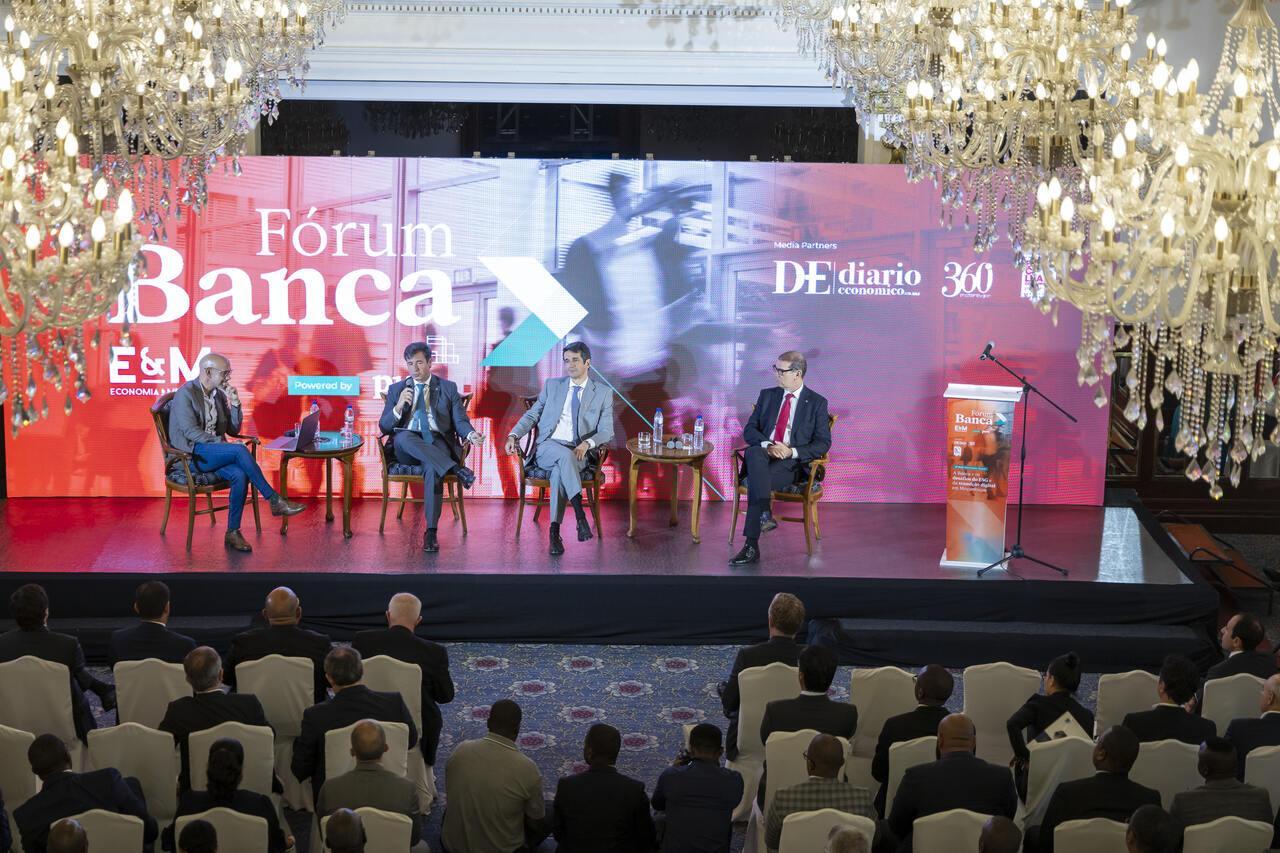
Africa-Press – Mozambique. The first round table of the I E&M-PwC Banking Forum, held on Thursday, April 18th in Maputo, “ESG, Financial Inclusion and Digital Transition in Mozambique from the Perspective of Systemic Banks” was the theme that brought together, for the first time, the CEOs of the three largest banks in the Mozambican interbank market.
Standard Bank, BCI, and Millennium Bim, represented at the highest level, shared initiatives, discussed strategies, and presented action plans on the adoption of sustainability criteria (ESG), digital transition, and financial inclusion in a debate that, in summary, showed alignment of perspectives among the three systemic banks, although with different approaches to some of the issues facing the global financial system. Watch the full video of the first round table at the end of the article.
Adoption of ESG in Banking Institutions
The adoption of environmental, social, and governance (ESG) criteria by the main national banks is now critical and strategic for the entire sector. Bernardo Aparício, CEO of Standard Bank, began by highlighting the need for a “fair and equitable energy transition” for all, emphasizing the role of the institution he leads in supporting “companies that contribute to the development of essential ecosystems,” and recalling significant projects in infrastructure and transition energy that Standard Bank has financed, “as a result of its commitment to the sustainable growth of the African continent.” You can see the full video of the panel at the end of the article.
“We are aware of the importance of balancing environmental issues with social ones, so that progress in one sector does not harm the other. With a presence in 20 African countries, we understand that the transition to sustainable energies should not hinder the development of these nations.
Our commitment is to grow with the continent, fostering progress in Africa and improving the lives of its inhabitants,” he added, without forgetting the “commitment to significant transition energy projects, such as natural gas” of which the bank, as is known, is one of the financiers. He also highlighted the continuation of support for projects in countries such as Mozambique, Namibia, and Uganda, “promoting an energy transition adapted to African needs.”
BCI CEO, Francisco Costa, emphasized “the importance of internal and external initiatives” of the bank to promote sustainable practices, mentioning that, “internally, we focus on our consumption and rationalization of the energies we use, namely in the transition to renewable energies,” and revealing that “pilots with solar energy are already being implemented in some branches, reflecting a genuine concern and a conscious approach to these issues.”
Regarding external initiatives, he assumed that due to the size and impact of the bank on the economy, there is an influence tending towards change, “which we already exert on our suppliers. We have adopted ESG criteria in the procurement process, demonstrating the integration of these values into our daily operations.”
He also spoke, as a bank with European majority shareholders (Caixa Geral de Depósitos and BPI), about the impact of European regulations on ESG goals, namely the desirable carbon emission neutrality to be achieved in the coming decades. In addition, he emphasized the conviction that “it is possible to leverage the economy and business by adopting ESG practices, rather than limiting it, through active collaboration with clients in integrating these practices.”
In turn, João Martins, CEO of Millennium bim, emphasized “the urgency of recognizing and acting in the face of climate change,” highlighting the importance of reformulating organizational and consumption patterns to ensure sustainability, making it clear the bank’s ambition “to be an agent of change, committed to adopting sustainable practices and actively contributing to the preservation of the planet.”
And he continued, outlining some of the measures implemented by the bank: “we are introducing a new concept of counter, similar to what BCI is implementing, which incorporates the use of solar panels. The idea is for each counter to be carbon neutral. Also, at our headquarters, we are significantly investing in the installation of solar panels in large available areas, to substantially reduce our carbon footprint,” he explained.
Profit vs Green Investment? That’s not the case…
In recent years, there has been a latent issue in the global financial system related to ‘green’ investments, increasingly prioritized over projects that cause environmental impact – such as investments in extractive industries or in oil & gas. Bernardo Aparício highlighted, at this level, “the responsibility of banks in promoting energy transition, essential to achieve sustainability goals. Allocating capital to projects aligned with ESG is a business opportunity, as well as a responsibility,” he affirmed.
Francisco Costa focused on the synergy between profitability and social responsibility. “I do not see a conflict between profit and green investment, on the contrary. The more profitable the company is, the greater its capacity to contribute socially,” he emphasized. And he exemplified the bank’s commitment to sustainable practices, citing “the partnership with Biofund and the launch of a biodegradable card, reflections of our social responsibility DNA.”
From the Millennium Bim’s perspective, João Martins addressed the complexity and inevitability of the ESG agenda and wanted to make it clear that both are not conflicting, quite the opposite. “We are facing a costly but necessary change, which will require profound adaptation in the way we all operate,” he noted.
And he did not fail to express “the bank’s commitment to overcoming challenges in sustainable development,” alluding once again to the need to “balance investments and sustainable practices,” because, he agreed, “this is not a trade-off, this is not how I see it. It is possible to continue investing in the economy and its growth, in a more and more sustainable way and with less impact, and there are more and more tools for this in the financial sector.”
Digital Innovation “Essential” to Promote Financial Inclusion
Another major theme of discussion was, of course, the ongoing digital transition, a point where the leaders of the three largest national banks exposed the strategies adopted by their institutions to capitalize on the digital age, expand the offering of financial services, and, a common point to all, bring as many banking services as possible, at the lowest cost possible, to the largest number of Mozambicans in the coming years. The discussions focused on how digital transformation is opening doors to greater access to banking services, reflecting a joint effort to incorporate more Mozambicans into the formal financial system.
Bernardo Aparício began by listing Standard Bank’s projects focused precisely on digitization and financial inclusion. “We are aligned to include the largest number of Mozambicans in the formal economy and payment system, and at lower costs. There are several projects in development, such as the new payment system, real-time transfers, and biometrics, which will begin soon. These are projects that have been worked on in collaboration with the entire financial sector and the regulator, and will continue to progress in the coming years to facilitate and reduce the cost of transactionality in Mozambique.”
Francisco Costa clarified that BCI is involved “in an internal aspect of digitization that focuses on the significant impact on data processing, value creation through data analysis, and reduction of operational errors. These actions strengthen the banking business and have a positive impact on customers, increasing the bank’s ability to enhance knowledge about the customer, segmentation, and proximity, making the market more efficient and able to respond to customer needs.”
As for Millennium Bim, through João Martins’ voice, he highlighted that digital strategy “is fundamental” in the bank’s operation and that, already today, “all decisions are made with digital in mind because it is through this means that financial inclusion is promoted. Bim’s digital strategy bifurcates into two main aspects, external and internal.
On the external side, the bank has heavily invested in its mobile applications and other digital solutions, as evidenced by the impressive numbers: over 20 million transactions are made monthly via mobile, with peaks of up to 30 million. The robustness of the systems is essential to support this volume of transactions and to offer the service that customers expect and need. Regarding the internal aspect, Bim is committed to digitizing and automating processes to achieve the level of service we intend. Without this internal digital evolution, the bank would not have the capacity to expand and serve an increasing number of customers, which is the goal.”
Cybersecurity: An Old Challenge with New Threats Lurking. AI is Already Present and Will Be Part of the Future
Bernardo Aparício began by emphasizing “the need for a deep understanding of cyber risks” by all involved, from employees to customers. “Knowledge is the first essential step in preventing cyber attacks,” he emphasized, before pointing out the investment in cutting-edge technology and careful access management, which constitute another pillar in the bank’s defense strategy. “We continuously invest in advanced technology, aligning ourselves with global standards, to protect our infrastructures and channels,” he detailed.
Francisco Costa reinforced the importance of a robust business continuity plan. “In addition to investments in security, we have prepared for the eventuality of attacks – and we know they are inevitable – ensuring that the bank can restore operational normalcy as quickly as possible.”
In turn, João Martins highlighted the emerging role of Artificial Intelligence (AI) in fraud detection and prevention. “AI is a valuable resource in our security strategy, improving not only fraud detection but also service offerings,” he commented, pointing out that once again “this type of attack is becoming increasingly widespread,” becoming inevitable.
In the last question of the debate, about the rise of Artificial Intelligence and how it can be used by the financial sector, the three agreed, noting that there are more doubts than certainties about its potential, which is now, still, beginning to be grasped by banks and many other sectors, but the doubt about how and when it will enter banking operations was dispelled, and the three largest national banks already use it, from customer support to big data analysis.
The first edition of the Banking Forum, a joint initiative of Media4Development, a Mozambican publisher holding the magazine Economia & Mercado and the portals Diário Económico and 360o Mozambique, in partnership with the consulting firm PWC, had as its theme “Banking and the Challenges of ESG and Digital Transition in Mozambique.”
The first edition of this Forum took place in a context where emerging ESG (Environmental, Social, and Governance) challenges and the transition and digital transformation are crucial for the Sustainable Development of Mozambique and brought together, publicly and for the first time, the CEOs of some of the largest national banking institutions – BCI, Standard Bank, Millennium Bim, Access Bank, FNB, and Nedbank, in addition to the Mozambican Association of Banks.
For More News And Analysis About Mozambique Follow Africa-Press





